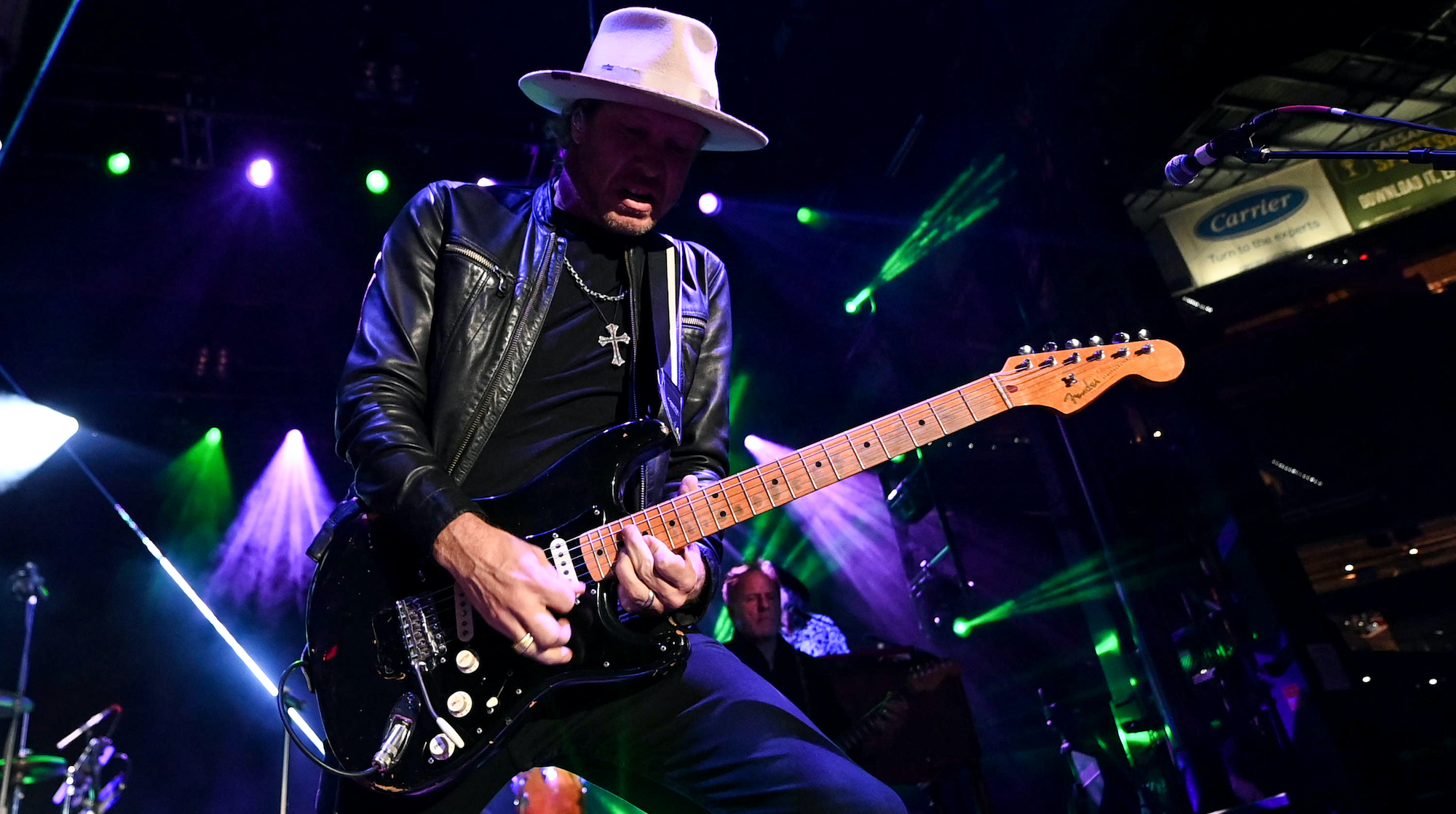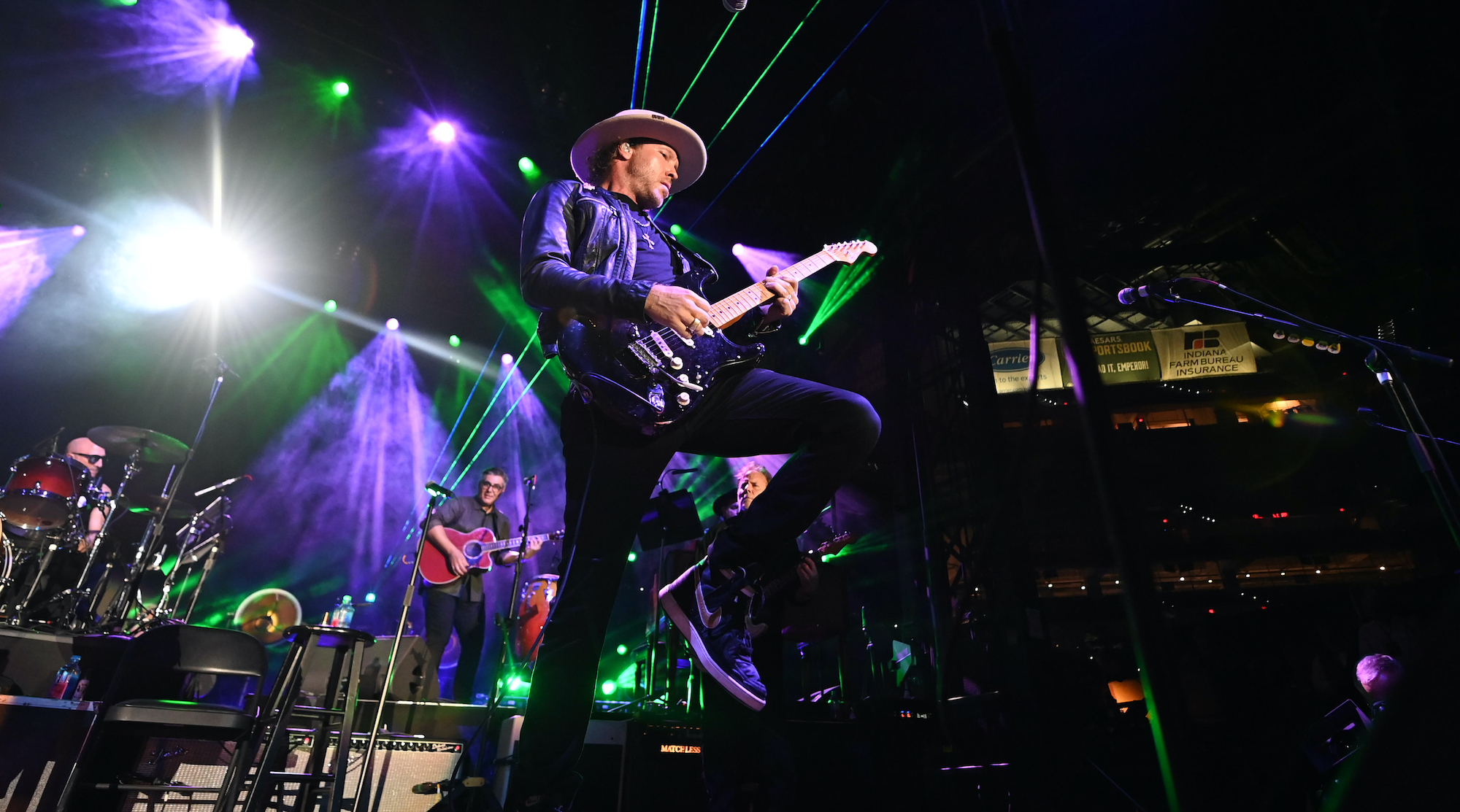Kenny Wayne Shepherd: "Once I found out we were going to be playing Comfortably Numb, I was quietly hoping Jim Irsay would ask me to play the Black Strat"
The blues guitar ace reflects on what it was like to play one of the most famous Stratocasters in history, and why he chose to give listeners "a bit of old and a little bit of new" with a re-recorded version of Trouble Is…

As a young blues-breaker, Kenny Wayne Shepherd took the world by storm in the mid-'90s with his stunning debut album, Ledbetter Heights.
The music business is fickle, though, and young artists are often quickly forgotten. With that in mind, Shepherd knew that to sustain that level of success, he would have to match Ledbetter Heights pound for pound, lest he be relegated.
"Looking back, I knew I wanted to keep my momentum," recalls Shepherd. "I knew I didn't want my second record to fall flat. The idea of a 'sophomore slump' started to pop up during interviews, and that was the first time it crept into my mind. People were asking me how I'd beat it and my plan, so I felt a certain amount of pressure going in. But I think being so young helped me because while I felt pressure, I was naive enough not to let it weigh me down too much."
If the objective was to match Ledbetter Heights, in retrospect, it's easy to see that Shepherd did that and then some. In truth, the soulful six-stringer bettered his debut with 1997's Trouble Is…, a record that saw Shepherd cement his status as a top-tier hitmaker and guitar-slinger.
"After Trouble Is.. came out, I think that's when critics started to believe," Shepherd muses. "I think some people wondered if I'd be able to have the same success with my second record as I did with my first, and I think that quickly proved that I could.
"At the time, the album's success was amazing, but looking back at it as a 45-year-old, it's a lot sweeter. Trouble Is… has had a ton of meaning in my life and career, but as a more mature musician, the meaning it's had for the fans holds the most weight for me."
Some 25 years after its original release, Shepherd has found longevity. Moreover, he celebrated the legacy of Trouble Is… by re-recording the record as Trouble Is… 25. It seems that Shepherd has struck a delicate balance in paying tribute to the original recordings while also giving droves of new fans something unique and modern to chew on.
Get The Pick Newsletter
All the latest guitar news, interviews, lessons, reviews, deals and more, direct to your inbox!
"The key to re-recording Trouble Is… was not to reinvent the wheel," admits Shepherd. "The way I saw it was, I already had an album that I loved, but I wanted to do something special. So, we didn't make any wholesale changes or turn this into an entirely new album.
"Honesty, the coolest thing was I used all the same gear I used the first time around. I had to have a bunch of the tubes in the amps repaired because I hadn't fired them up in a while. And I used the same Strats and all of that, too, and I feel that was very important in retaining the album's soul. But the great thing was that I'm a better player now, and I think those two points give listeners a bit of old and a little bit of new."
Reflective as he looks back on the 25th anniversary of Trouble Is…, Shepherd recently checked in with Guitar World to recount the album's origins, re-recording, and legacy, and his experience playing David Gilmour's legendary black 1969 Fender Stratocaster.

You recently re-recorded Trouble Is… as Trouble Is...25. What went into that decision?
"Well, 25 years is certainly a milestone. It's a quarter-century of that record being played, which still amazes me. It's still on the airwaves and streamed in large numbers, and I can't tell you how grateful I am for that.
"I felt like I accomplished a lot with my first record, Ledbetter Heights, and I wanted to expand on that with my second album. People's second records often fall short, so I was determined not to have that happen to me. I wanted to exceed what I did with my first one, and we did that by leaps and bounds.
"I think a lot of my fans got turned on to my music through Trouble Is… and because of that, it's an important album for me and one worth recognizing by recording again."
Why wasn't your cover of Bob Dylan's Ballad of a Thin Man included in the original version of Trouble Is…?
"That was my decision because, at that time, my producer, Jerry Harrison, suggested Ballad of a Thin Man, and I brought the other Bob Dylan song, Everything Is Broken, to the table. So, what happened was I said, 'We can't have two Bob Dylan songs on here; which should we cut?' And I felt that Everything Is Broken showed more depth from me and the band.
"I also felt that Everything Is Broken was us playing it safer and more in my wheelhouse. Again, it was important that this album not fall off the radar, so that went into the decision, too. It's what my fans would expect from me because I felt it had a more traditional blues arrangement than Ballad of a Thin Man."
What changed your mind during the re-recording?
"When I was listening back to the rough mix of Ballad of a Thin Man, I saw it differently than I did back then. When I heard it all these years later, I was like, 'Wow. This is a great version of this song. I want to get this out there.' So, I thought it would be interesting to include it on this record. It gives the fans something interesting to sink their teeth into, and it's a new look for people who have been listening to Trouble Is… for 25 years."
What was your approach to the re-recorded version of Trouble Is…?
"We initially did two versions. We did one version where we stayed true to the original recording, and then we did another version where we recorded the songs in a way that I feel they might have evolved. We ultimately went with the version more faithful to the sound because people have been listening to this record for so long, and I didn't want to give them something completely alienating.
"So, while it sounds familiar, there are just enough subtle differences here and there that they still get to have a new listening experience as they listen. Some songs are very close to the original recordings, and some have slight variances. But we didn't do anything too crazy or outside the box where we heavily strayed from the original."
Which tracks are your favorites, and why?
"Certainly, Blue on Black is an obvious one. True Lies is one of my favorites because it has a killer groove, I love the lyrics, and the riff is a ton of fun to play. A lot of people have told me that I Found Love (When I Found You) has played an essential part in their lives, so that one is meaningful for sure.
"I can't tell you how many people have written to me and said that it was their wedding song or that it played a role in a moment in their lives that they'll never forget. It's crazy because I wrote that song when I was 18, and I never imagined it would be so meaningful to people. To have a song that I created when I was so young live on as it has, it's significant to me."

How did beating the so-called 'sophomore slump' affect you as you moved forward in your career?
"Going into my first record, I was a teenager, and it was hard for someone that young to realize the full magnitude of what was going on. There was a tremendous amount of pressure that was on me, and I felt that. But at the same time, I had confidence because I had success with the first album, and the fans reacted to the first record in a way that made me feel like I wouldn't slump.
"So, I followed my instincts, and it got me to where I'm at. That gave me the confidence to continue forward along that path."
When you look back on Trouble Is…, how do you measure its retrospective importance?
"I was young and very naive. All I knew was that I didn't want the record to fail and wanted to make a record that people would remember. So, it built up my confidence and got me to a place where I was no longer second-guessing myself. I trusted myself to make musical decisions without worrying about failure.
"With everything you do in this business, you're taking a gamble, and you're not always sure-footed, but I felt confident in my ability to navigate that.
"So, I'd say that Trouble Is… gave me additional reassurance that I could get through high and low points and come out the other side just fine. Doing this tour, re-recording this album, and playing this music every night has gotten me re-acquainted with the intricate details of this record. And what's been fun, and enlightening, is how good the record still is today.
"I look back and go, 'Wow, man. I was 18 years old when I wrote some of this, and here I am playing this stuff now when I'm 45 years old.' It's still fun and just as relevant. The fans are just as excited to hear the songs, and I feel really proud of it."
I wanted to pivot to David Gilmour's famous '69 Black Strat, which you had the opportunity to play. How did that come to be?
"I think it's pretty well known that the owner of the guitar is Jim Irsay, owner of the Indianapolis Colts football team. Jim and I have been friends for going on 20 years now. He is an avid music lover and collector of iconic items that have shaped our culture. This year, Jim formed an all-star band as part of the live entertainment experience of the Jim Irsay Collection that's been touring around the country.
"Jim loves to sing and play music, and we've been doing that together since the Colts won the Super Bowl back in 2006. Around that time, Jim, myself, Mike Mills, Kenny Aronoff and Mike Wanchic – along with John Mellencamp and Stephen Stills – jammed together at a party Jim threw the night before the game.
"That was an amazing experience that we have gone on to repeat several times at events with Jim over the years, and I believe that was the original genesis of this band we have today."
What emotions flow through you when you've got David's Strat in your hands?
"I would say it's one of those special moments that's hard to express in words. There are so many guitar players around the world that would do anything just to hold that guitar in their hands, much less play it on stage. I feel humbled and honored to be trusted with such a task.
"It's my understanding that Jim and his team have done very little, if anything, to change the guitar from how it was when David Gilmour owned it. Probably the only thing they've done is put new strings on it.
"We all know that guitar setups are player-specific, so that means that the black Strat was not necessarily set up the way I would set up my guitars, but in this situation, it's not for me to make any changes to the instrument. It's my job to adapt to the guitar and make the very best of it that I can.
"Thankfully, the way David likes his guitar set up doesn't seem to be too far off from how I have mine, so it was not so much of a struggle, and that enabled me to be more in the moment with the music."
How did it alter your approach in that moment, if at all?
"I would say the primary effect that the guitar had on me in the moment was that I was trying to see if I could get it to make some of those signature sounds that that instrument is so well known for.
"The goal for me was not to try and be David Gilmour, but to try and play enough of the signature parts of that song that I didn't alienate the original and then – at the same time – take some liberties to infuse my own personality and playing approach into the performance."
What went into the decision to play Comfortably Numb?
"The only song that I played that night on that guitar was Comfortably Numb. The whole thing was Jim's idea. I've played that guitar at a couple of other performances, but we didn't make a huge deal out of it, and I never played any Pink Floyd songs on it until that night.
"I will say once I found out we were going to be playing Comfortably Numb in the show, I was quietly hoping Jim would ask me to play the Black Strat on that song, but I kept it to myself and waited to see how things worked out. Jim had a very specific vision for this moment in the show, and it was incredible watching it come together and being a part of it."
Are there plans to play David's Strat again in the future?
"One of the most admirable things about Jim regarding his collection is that he wants to share it with everyone. The shows are free, and he wants these items to continue to have an impact on people's lives in some instances – he wants them to come to life as part of the show. The JIC is continuing to tour around the US, with our next stop being in San Francisco on December 10."

What are some of the most important lessons you've learned throughout your career that you'll apply as you move forward?
"Well, one of the things that I learned while making my first two albums was that having human beings playing in a room together is the only way I want to make records, and there is no substitute for that. I still believe in that, and I still apply that mindset to this day.
"You can have people send email files back and forth, but there is no substitute for being in the same room together, playing at the same time. I don't like making albums where you've got a guy across the country on the West Coast emailing his drum track to the other person in Texas. I feel you can hear the difference when we're all in the room together, and so that's a lesson I learned early on.
"The other thing I've learned is to remain spontaneous and open to the exciting directions music can take you. I try and stay in the moment because, for me, when it comes to guitar, it's always been about emotion and feel as opposed to flash.
"So, with that in mind, I try putting every ounce of feeling I have in my body into whatever note I'm playing in the moment, and hopefully, that makes people feel something. If I can make the listener feel even a little bit of what I'm feeling through my guitar, that's a win."
- Kenny Wayne Shepherd’s Trouble Is…25 is out now via Provogue Records/Mascot Label Group.
Andrew Daly is an iced-coffee-addicted, oddball Telecaster-playing, alfredo pasta-loving journalist from Long Island, NY, who, in addition to being a contributing writer for Guitar World, scribes for Bass Player, Guitar Player, Guitarist, and MusicRadar. Andrew has interviewed favorites like Ace Frehley, Johnny Marr, Vito Bratta, Bruce Kulick, Joe Perry, Brad Whitford, Tom Morello, Rich Robinson, and Paul Stanley, while his all-time favorite (rhythm player), Keith Richards, continues to elude him.
“His songs are timeless, you can’t tell if they were written in the 1400s or now”: Michael Hurley, guitarist and singer/songwriter known as the ‘Godfather of freak folk,’ dies at 83
“The future is pretty bright”: Norman's Rare Guitars has unearthed another future blues great – and the 15-year-old guitar star has already jammed with Michael Lemmo










